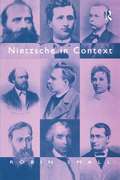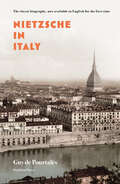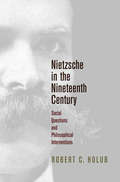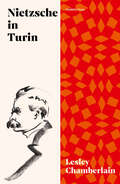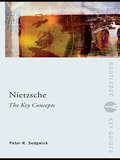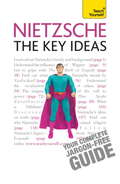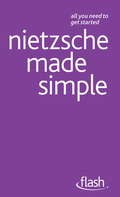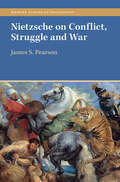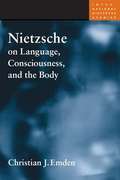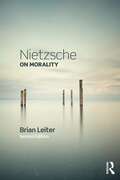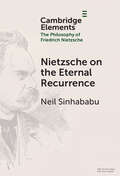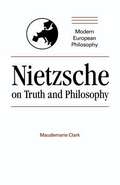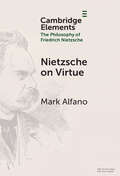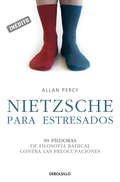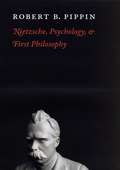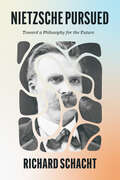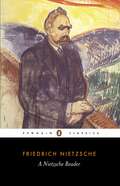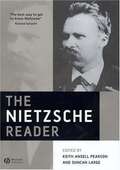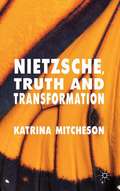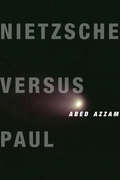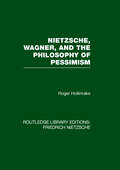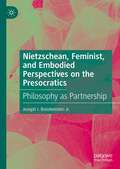- Table View
- List View
Nietzsche in Context
by Robin SmallNietzsche in Context presents a comprehensive reinterpretation of Nietzsche’s thought, placing Nietzsche in the context of the philosophers of his own time. Offering a survey of important philosophical themes, Robin Small identifies the writer or writers with whom Nietzsche most felt himself to be engaging in dialogue. This historical dimension is complemented by original analysis and interpretation of the ideas under discussion. Nietzsche in Context takes Nietzsche scholarship into new and fruitful directions. By locating his ideas within a broader context, this book provides a comprehensive reinterpretation of Nietzsche’s thought adding to the continuing interest of his contributions to philosophy.
Nietzsche in Italy
by Guy De PourtalesA fascinating classic account of Nietzsche's travels in Italy at the end of the nineteenth century, where he found inspiration for his major works First published in 1929, Nietzsche in Italy has never been out of print in France but has never been translated into English until now.Endlessly fascinating and highly readable, Nietzsche in Italy will enthrall anyone interested in Nietzsche's relationship with the country that enriched his soul more than any other. For fifteen years, after his first visit to the country in 1876, Nietzsche was repeatedly and irresistibly drawn back to Italy's climate and lifestyle. It was there that he composed his most famous works, including Thus Spake Zarathustra and Ecce Homo. This classic biography follows the troubled philosopher from Rome, to Florence, via Venice, Sorrento, Genoa, Sicily and finally to the tragic denouement in Turin, the city in which Nietzsche found a final measure of contentment before his irretrievable collapse.
Nietzsche in the Nineteenth Century: Social Questions and Philosophical Interventions (Intellectual History of the Modern Age)
by Robert C. HolubFriedrich Nietzsche is often depicted in popular and scholarly discourse as a lonely philosopher dealing with abstract concerns unconnected to the intellectual debates of his time and place. Robert C. Holub counters this narrative, arguing that Nietzsche was very well attuned to the events and issues of his era and responded to them frequently in his writings. Organized around nine important questions circulating in Europe at the time in the realms of politics, society, and science, Nietzsche in the Nineteenth Century presents a thorough investigation of Nietzsche's familiarity with contemporary life, his contact with and comments on these various questions, and the sources from which he gathered his knowledge.Holub begins his analysis with Nietzsche's views on education, nationhood, and the working-class movement, turns to questions of women and women's emancipation, colonialism, and Jews and Judaism, and looks at Nietzsche's dealings with evolutionary biology, cosmological theories, and the new "science" of eugenics. He shows how Nietzsche, although infrequently read during his lifetime, formulated his thought in an ongoing dialogue with the concerns of his contemporaries, and how his philosophy can be conceived as a contribution to the debates taking place in the nineteenth century. Throughout his examination, Holub finds that, against conventional wisdom, Nietzsche was only indirectly in conversation with the modern philosophical tradition from Descartes through German idealism, and that the books and individuals central to his development were more obscure writers, most of whom have long since been forgotten.This book thus sheds light on Nietzsche's thought as enmeshed in a web of nineteenth-century discourses and offers new insights into his interactive method of engaging with the philosophical universe of his time.
Nietzsche in Turin: The End of the Future
by Lesley ChamberlainBeautifully packaged reissue of the vividly lyrical biography of Nietzsche that John Banville called 'a major intellectual event'In 1888, philosopher Friedrich Nietzsche moved to Turin. This would be the year in which he wrote three of his greatest works: Twilight of the Idols, The Antichrist, and Ecce Homo; it would also be his last year of writing. He suffered a debilitating nervous breakdown in the first days of the following year. In this probing, elegant biography of that pivotal year, Lesley Chamberlain undoes popular clichés and misconceptions about Nietzsche by offering a deeply complex approach to his character and work. Focusing as much on Nietzsche's daily habits, anxieties and insecurities as on the development of his philosophy, Nietzsche in Turin offers a uniquely lively portrait of the great thinker, and of the furiously productive days that preceded his decline.
Nietzsche: The Key Concepts (Routledge Key Guides)
by Peter R. SedgwickNietzsche: The Key Concepts is a comprehensive guide to one of the most widely-studied and influential philosophers of the nineteenth century. This invaluable resource helps navigate the often challenging and controversial thought outlined in Nietzsche’s seminal texts. Fully cross-referenced throughout and in an accessible A-Z format with suggestions for further reading, this concise yet thorough introduction explores such ideas as: decadence epistemology modernity nihilism will to power This volume is essential reading for students of philosophy and will be of interest to those studying in the fields of literature, religion and cultural theory.
Nietzsche - The Key Ideas: Teach Yourself (Teach Yourself General)
by Roy JacksonNietzsche remains one of the most influential philosophers of our time and this book is the definite guide to his philosophy. Whether you're a philosophy student struggling with phrases like 'the superman' and 'the will to power', or whether you simply want to understand more about the life and work of this fascinating man, this easy-to-navigate guide will help you to demystify Nietzsche's influential ideas and discover his legacy to modern thought. NOT GOT MUCH TIME? One, five and ten-minute introductions to key principles to get you started. AUTHOR INSIGHTS Lots of instant help with common problems and quick tips for success, based on the author's many years of experience. TEST YOURSELF Tests in the book and online to keep track of your progress. EXTEND YOUR KNOWLEDGE Extra online articles at www.teachyourself.com to give you a richer understanding of psychology. FIVE THINGS TO REMEMBER Quick refreshers to help you remember the key facts. TRY THIS Innovative exercises illustrate what you've learnt and how to use it.
Nietzsche - The Key Ideas: Teach Yourself (Teach Yourself General Ser.)
by Dr Roy JacksonNietzsche remains one of the most influential philosophers of our time and this book is the definite guide to his philosophy. Whether you're a philosophy student struggling with phrases like 'the superman' and 'the will to power', or whether you simply want to understand more about the life and work of this fascinating man, this easy-to-navigate guide will help you to demystify Nietzsche's influential ideas and discover his legacy to modern thought.NOT GOT MUCH TIME?One, five and ten-minute introductions to key principles to get you started.AUTHOR INSIGHTSLots of instant help with common problems and quick tips for success, based on the author's many years of experience.TEST YOURSELFTests in the book and online to keep track of your progress.EXTEND YOUR KNOWLEDGEExtra online articles at www.teachyourself.com to give you a richer understanding of psychology.FIVE THINGS TO REMEMBERQuick refreshers to help you remember the key facts.TRY THISInnovative exercises illustrate what you've learnt and how to use it.
Nietzsche Made Simple: Flash
by Roy Jackson David WellerThe books in this bite-sized new series contain no complicated techniques or tricky materials, making them ideal for the busy, the time-pressured or the merely curious. Nietzsche Made Simple is a short, simple and to-the-point guide to Nietzsche. In just 96 pages, the reader will discover all his ideas, from the Superman to the Will to Power. Ideal for the busy, the time-pressured or the merely curious, Nietzsche Made Simple is a quick, no-effort way to break into this fascinating topic.
Nietzsche on Conflict, Struggle and War (Modern European Philosophy)
by James S. PearsonNietzsche controversially valorizes struggle and war as necessary ingredients of human flourishing. In this book, James S. Pearson reconstructs Nietzsche's rationale for placing such high value on relations of conflict. In doing so, Pearson reveals how Nietzsche's celebration of social discord is interwoven with his understanding of nature as universal struggle. This study thus draws together Nietzsche's writings on politics, culture, metaphysics, biology and human psychology. It also overcomes an entrenched dispute in the critical literature. In the past, commentators have tended to interpret Nietzsche either as an advocate of radical aristocratic violence or, by contrast, a defender of moderate democratic contest. This book navigates a path between these two opposed readings and shows how Nietzsche is able to endorse both violent strife and restrained competition without contradicting himself.
Nietzsche on Language, Consciousness, and the Body
by Christian J. EmdenNietzsche and the philosopy of language have been a well trafficked crossroads for a generation, but almost always as a checkpoint for post-modernism and its critics. This work takes a historical approach to Nietzsche's work on language, connecting it to his predecessors and contemporaries rather than his successors. Though Nietzsche invited identification with Zarathustra, the solitary wanderer ahead of his time, for most of his career he directly engaged the intellectual currents and scientific debates of his time. Emden situates Nietzsche's writings on language and rhetoric within their wider historical context. He demonstrates that Nietzsche is not as radical in his thinking as has been often supposed, and that a number of problems with Nietzsche disappear when Nietzsche's works are compared to works on the same subjects by writers of the 18th and 19th centuries. Further, the relevance of rhetoric and the history of rhetoric to philosophy and the history of philosophy is reasserted, in consonance with Nietzsche's own statements and practices. Important in this regard are the role of fictions, descriptions, and metaphor.
Nietzsche on Morality: Thoughts on the Prejudices of Morality (Cambridge Texts in the History of Philosophy Ser.)
by Brian LeiterBoth an introduction to Nietzsche’s moral philosophy, and a sustained commentary on his most famous work, On the Genealogy of Morality, this book has become the most widely used and debated secondary source on these topics over the past dozen years. Many of Nietzsche’s most famous ideas - the "slave revolt" in morals, the attack on free will, perspectivism, "will to power" and the "ascetic ideal" - are clearly analyzed and explained. The first edition established the centrality of naturalism to Nietzsche’s philosophy, generating a substantial scholarly literature to which Leiter responds in an important new Postscript. In addition, Leiter has revised and refreshed the book throughout, taking into account new scholarly literature, and revising or clarifying his treatment of such topics as the objectivity of value, epiphenomenalism and consciousness, and the possibility of "autonomous" agency.
Nietzsche on the Eternal Recurrence (Elements in the Philosophy of Friedrich Nietzsche)
by Neil SinhababuThe idea of the eternal recurrence is that we will live the exact same lives again an infinite number of times. Nietzsche appreciates that this would multiply the value of a single life by infinity, justifying intense emotional responses. His unpublished notes provide a cosmological argument for the eternal recurrence that anticipates Poincaré's recurrence theorem. Nietzsche's Thus Spoke Zarathustra describes its hero discovering this idea and struggling to accept the recurrence of all bad things. He eventually comes to love the eternal recurrence because it will bring back all the joys of his life, and teaches this idea to others.
Nietzsche on Truth and Philosophy (Modern European Philosophy)
by Maudemarie ClarkThe Nietzsche who emerges from these pages is a subtle and sophisticated philosopher, whose highly articulated views are of continuing interest as contributions to a whole range of philosophical issues. This remarkable reading of Nietzsche will interest not only philosophers, but also readers in neighbouring disciplines such as literature and intellectual history.
Nietzsche on Virtue (Elements in the Philosophy of Friedrich Nietzsche)
by Mark AlfanoThis Element argues for an interpretation of Nietzsche on virtue according to which he believes that because different people have different constellations of instincts and other drives, and because instincts and drives can only be shaped and redirected within boundaries, he recommends different virtues as fitting and conducive to flourishing for different types of people. In his own way, these include curiosity, intellectual courage, the pathos of distance, having a sense of humor, and solitude. This interpretation is supported by both a digital humanities methodology and close readings of passages from Nietzsche's middle, mature, and late works.
Nietzsche para estresados: 99 píldoras de filosofía radical contra las preocupaciones (Genios para la vida cotidiana #Volumen)
by Allan PercyEn Nietzsche para estresados, de la serie «Genios para la vida cotidiana», Allan Percy imparte un divertido y revelador curso de filosofía para el día a día basado en el pensamiento de Friedrich W. Nietzsche. Este libro práctico reúne 99 máximas del genio alemán y su aplicación práctica a todos los entornos y situaciones del día a día. Tanto para el mundo de la empresa como para el ámbito personal, la filosofía de Nietzsche es altamente efectiva para hallar salida a cualquier encrucijada. Cada capítulo se abre con un aforismo, seguido de una interpretación en clave práctica de Allan Percy, que servirá de ayuda para tomar decisiones, recuperar el aliento, enderezar el rumbo perdido y relativizar la importancia de las cosas que nos suceden durante la jornada. Los lectores han dicho...«Una obra para leer antes de dormir o cuando queremos relajarnos.» «Un libro muy bueno, ya estés habituado o no a leer filosofía. Está dividido en capítulos cortos con frases de Nietzsche para el día a día y se hace muy ameno de leer.»
Nietzsche para estresados
by Allan PercyEste libro práctico reúne 99 máximas del genio alemán y su aplicación práctica a todos los entornos y situaciones del día a día. Tanto para el mundo de la empresa como para el ámbito personal, la filosofía de Nietzsche es altamente efectiva para hallar salida a cualquier encrucijada. Cada capítulo se abre con un aforismo, seguido de una interpretación en clave práctica de Allan Percy, que servirá de ayuda para tomar decisiones, recuperar el aliento, enderezar el rumbo perdido y relativizar la importancia de las cosas que nos suceden durante la jornada.
Nietzsche, Psychology, and First Philosophy
by Robert B. PippinFriedrich Nietzsche is one of the most elusive thinkers in the philosophical tradition. His highly unusual style and insistence on what remains hidden or unsaid in his writing make pinning him to a particular position tricky. Nonetheless, certain readings of his work have become standard and influential. In this major new interpretation of Nietzsche's work, Robert B. Pippin challenges various traditional views of Nietzsche, taking him at his word when he says that his writing can best be understood as a kind of psychology. Pippin traces this idea of Nietzsche as a psychologist to his admiration for the French moralists: La Rochefoucauld, Pascal, Stendhal, and especially Montaigne. In distinction from philosophers, Pippin shows, these writers avoided grand metaphysical theories in favor of reflections on life as lived and experienced. Aligning himself with this project, Nietzsche sought to make psychology "the queen of the sciences" and the "path to the fundamental problems. " Pippin contends that Nietzsche's singular prose was an essential part of this goal, and so he organizes the book around four of Nietzsche's most important images and metaphors: that truth could be a woman, that a science could be gay, that God could have died, and that an agent is as much one with his act as lightning is with its flash. Expanded from a series of lectures Pippin delivered at the Collège de France, Nietzsche, Psychology, and First Philosophy offers a brilliant, novel, and accessible reading of this seminal thinker.
Nietzsche Pursued: Toward a Philosophy for the Future
by Richard SchachtAn ambitious venture into Nietzsche’s envisioned philosophy for the future. Nietzsche advocated for a post-theistic “philosophy of the future”—a new approach to human reality that would bend Western thought away from nihilism in a life-affirming, value-creative direction. His early demise left this endeavor only just begun. In Nietzsche Pursued, Richard Schacht examines Nietzsche’s revisionist approach to familiar philosophical topics, exploring how some may be further pursued in Nietzschean ways. Each chapter focuses on one topic that is central to Nietzsche's vision of what philosophy can and should be and do. Among them: his kind of naturalism, humanity, perspectivism, morality, and music. Building on his analysis in Nietzsche’s Kind of Philosophy, Schacht invites readers to see with new appreciation the ongoing significance of Nietzsche’s thought for philosophy’s future.
A Nietzsche Reader
by Friedrich NietzscheThe literary career of Friedrich Nietzsche (1844-1900) spanned less than twenty years, but no area of intellectual inquiry was left untouched by his iconoclastic genius. The philosopher who announced the death of God in The Gay Science (1882) and went on to challenge the Christian code of morality in Beyond Good and Evil (1886), grappled with the fundamental issues of the human condition in his own intense autobiography, Ecce Homo (1888). Most notorious of all, perhaps, his idea of the triumphantly transgressive übermann ('superman') is developed in the extreme, yet poetic words of Thus Spake Zarathustra (1883-92). Whether addressing conventional Western philosophy or breaking new ground, Nietzsche vastly extended the boundaries of nineteenth-century thought.
A Nietzsche Reader
by Friedrich Nietzsche R. J. HollingdaleThe literary career of Friedrich Nietzsche (1844-1900) spanned less than twenty years, but no area of intellectual inquiry was left untouched by his iconoclastic genius. The philosopher who announced the death of God in The Gay Science (1882) and went on to challenge the Christian code of morality in Beyond Good and Evil (1886), grappled with the fundamental issues of the human condition in his own intense autobiography, Ecce Homo (1888). Most notorious of all, perhaps, his idea of the triumphantly transgressive übermann ('superman') is developed in the extreme, yet poetic words of Thus Spake Zarathustra (1883-92). Whether addressing conventional Western philosophy or breaking new ground, Nietzsche vastly extended the boundaries of nineteenth-century thought.
The Nietzsche Reader
by Keith Ansell Pearson Duncan LargeThe Nietzsche Reader brings together in one volume substantial selections from the entire body of Nietzsche’s writings, together with illuminating commentary on Nietzsche’s life and importance, and introductions to his major works and philosophicalideas.
Nietzsche, Truth And Transformation
by Katrina MitchesonNietzsche scholarship has fallen into the trap of taking seriously either the epistemological or the existential import of Nietzsche's views on truth at the neglect of the other, obscuring a full understanding of Nietzsche's philosophy, and the potential of his methodology to contribute to the problem of how we can effect deliberate transformation. Nietzsche, Truth and Transformation addresses this gap by treating both these dimensions of Nietzsche's approach to truth in depth and considering their interrelation. It addresses the philosophical problem of on what basis, if knowledge is always from a perspective, one can criticise modern humanity and culture, and how such critique can be actively responded to. As well as providing a novel interpretation of Nietzsche's philosophical method, this book shows the continuing relevance of Nietzsche for contemporary debates in epistemology and to concerns for cultural and social change.
Nietzsche Versus Paul (Insurrections: Critical Studies in Religion, Politics, and Culture)
by Abed AzzamAbed Azzam offers a fresh interpretation of Nietzsche's engagement with the work of Paul the Apostle, reorienting the relationship between the two thinkers while embedding modern philosophy within early Christian theology. Paying careful attention to Nietzsche's dialectics, Azzam situates the philosopher's thought within the history of Christianity, specifically the Pauline dialectics of law and faith, and reveals how atheism is constructed in relation to Christianity.Countering Heidegger's characterization of Nietzsche as an anti-Platonist, Azzam brings the philosopher closer to Paul through a radical rereading of his entire corpus against Christianity. This approach builds a compelling new history of the West resting on a logic of sublimation, from ancient Greece and early Judaism to the death of God. Azzam discovers in Nietzsche's philosophy a solid, tangible Pauline structure and virtual, fragile Greek content, positioning the thinker as a forerunner of the recent "return to Paul" led by Badiou, Agamben, i ek, and Breton. By changing the focus of modern philosophical inquiry from "Nietzsche and philosophy" to "Nietzsche and Christianity," Azzam initiates a major challenge to the primacy of Plato in the history of Western philosophy and narrow certainties regarding Nietzsche's relationship to Christian thought.
Nietzsche, Wagner and the Philosophy of Pessimism (Rouledge Library Editions: Friedrich Nietzsche)
by Roger HollinrakeNietzsche’s relationship with Wagner has long been a source of controversy and has given rise to a number of important studies, including this major breakthrough in Nietzsche scholarship, first published in 1982. In this work Hollinrake contends that the nature and extent of the anti-Wagnerian pastiche and polemic in Thus Spake Zarathustra is arguably the most important factor in the association between the two. Thus Wagner, as the purveyor of a particular brand of Schopenhauerian pessimism, is here revealed as one of the principle sources – and targets – of Zarathustra. Whilst addressed primarily to students of German Literature, this book will also be of interest to musicians, philosophers and students of the history of culture and ideas.
Nietzschean, Feminist, and Embodied Perspectives on the Presocratics: Philosophy as Partnership
by Joseph I. Breidenstein Jr.This book is the first sustained scholarly account of women and goddesses in presocratic philosophy. It approaches the origin of western philosophy via Nietzsche, Feminism, and Embodied Cognition in order to argue that the presocratics were reviving, within the largely patriarchal and death-glorifying culture of archaic Greece, a paleo/neolithic goddess-centered religiosity that affirmed life and rebirth. By taking readers from prehistoric Europe to classical Athens, Joseph I. Breidenstein Jr. provides a novel narrative of the dawn of western philosophy which is more comprehensive than traditional accounts and which helps us address contemporary problems—the patriarchal attitudes and ideas that continue to corrupt academic-philosophical culture; the fascist-dominator lifestyle that continues to threaten western democracy and which is encouraged by the patriarchal aspects of academia; and the consumerism that continues to result from a materialistic-secular paradigm that is being increasingly recognized as both intellectually untenable and socially unsustainable.
